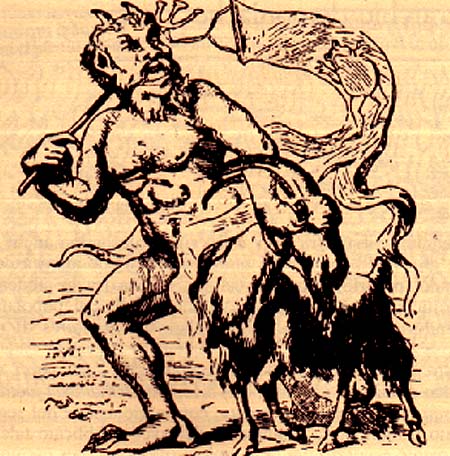 |
| Origin of this very Jungian image unknown |
But while discussing with an acquaintance at a gym full of gay men the oddity of overhearing too many conversations about Whitney Houston's final implosion, I remarked that I did not feel the need to grieve her because this fabulously wealthy singer was, after all, part of the One Percent. He just looked at me in a sort of politely stunned kind of way. (I enjoyed that.)
But is not the whole Occupy movement an exercise in scapegoating? People often assume you can only scapegoat an Official Victim Group. But if you can marry up, why can't you scapegoat up?
*Based on the dense and complex ritual text of Leviticus 16, the scapegoat, the goat sent away to Azazel, bearing the sins of Israel laid on it by Aaron, away from the community and out into the wilderness.


3 comments:
But Ex Cathedra, where will the hurt feelings or "violence" end if we don't agree to accept the supremacy of René Girard and never strive to compete with him, but instead admit that his version of stuff is the final version because it just can't be improved upon?
Think of the Bible's sharp condemnation of Aaron for hurting the Egyptian hierophants' feelings when his jiggery-pokery serpent unfairly ate up their jiggery-pokery serpents (Exodus 7:12).
Jesus too condemn'd any temptation to devise a righteousness that excel'd the leaven of the Pharisees. According to Q, the guiding concern of Jesus' entire mission was to avoid doing "violence" to the Pharisees sense of self worth. Or when Jesus pour'd righteous wrath upon the show-offy widow who donated her entire livelihood in the two coins she gave as though this amounted to a "better" righteousness than that of the rich who gave bigger amounts but without making a dent in their affluent lifestyle. As soon as you permit any distinction between so-call'd "better" and so-call'd "worse" in lifestyle, hurt feelings or violence are inevitable.
That's why Monsieur Girard was always careful to never hurt other justice theorists' feelings when he said that his theory of justice was better than theirs. He wasn't in any way competing with anyone else. He was only offering a final statement on justice as a way of saying that everyone's final statement on justice is of equal value.
My only beef with him is that he doesn't directly detail the worthlessness of Nietzsche on agôn in friendship and in poetic achievement order to make us really feel comfortable that the mimetic competition really is a bêtise that causes hurt feelings just for the sake of hurting feelings.
Also, Monsieur Girard fails to get revenge on Machiavelli for us by hurting Machiavelli's feelings for having try'd but surely fail'd to prove that account of the Romans, whom Machiavelli specially admires because they weren't imitators.
I like Girard because he validates my ressentiment against anyone better than I am. If I declare that I hate anyone better than I am, I am thus unprecedentedly more honest, thus in the final analysis better than those who preen they are better than I am. I even declare I resent Girard for his famousness for having devised his theory of justice -- which makes me better than he is, because he is violent to me or hurt my feelings.
And you've got to admit the New Testament condemns St Paul's imitatio Christi.
Fortunately Girard holds, as it seems to me, that "scapegoating" must continue. The "scapegoat mechanism" works! (even Abelard's moral theory of the atonement -- imitate the example of Christ)
All he cares to control is the _interpretation_ of the scapegoating. ... And that's really what liberal reformism reduces to, isn't it? I mean, the objection we may feel to WW1, say, isn't to the gas attacks, the bombardment of benighted youngsters, etc, but to competitive interpretations of WW1 after the event.
Also, I think he says that we are obligated to say that the scapegoats really weren't guilty. For instance, no interpreter of WW1 should say that the youngsters who fought in it were the (primary) culprits. But also, no doubt, we should agree that the war wasn't proleptically caused by the later interpreters; they too are innocent in every real way, right? even more innocent than the young soldiers. ... Interpreters shouldn't have to bear the wounds of hurt feelings for their karma.
As I used to joke, our bumperstickers should all say "Atonement happens."
Post a Comment